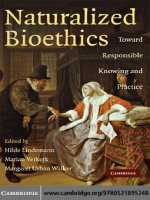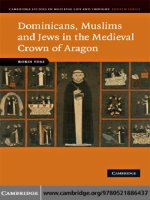0521899060 cambridge university press survivors songs from maldon to the somme nov 2008
Bạn đang xem bản rút gọn của tài liệu. Xem và tải ngay bản đầy đủ của tài liệu tại đây (909.16 KB, 242 trang )
This page intentionally left blank
SURVIVORS’ SONGS
From Homer to Heaney, the voices of men and women have
seldom been more piercing, more poignant, than in time of conflict.
For fifty years, Jon Stallworthy has been attuned to such voices. In
Survivors’ Songs he explores a series of poetic encounters with war,
with essays on Rupert Brooke, Siegfried Sassoon, Wilfred Owen,
and others. Beautifully written, this moving book sets the poetry
and prose of the First World War and its aftermath in the wider
context of writing about warfare from prehistoric Troy to AngloSaxon England; from Agincourt to Flanders; from El Alamein to
Vietnam; from the wars of yesterday to the wars of tomorrow.
jon stallworthy is a poet and a Fellow of the British
Academy. Formerly Professor of English Literature at Wolfson
College, Oxford, he is the author of prize-winning biographies
of Wilfred Owen and Louis MacNeice, the editor of Owen’s
Complete Poems and Fragments and of The Oxford Book of War
Poetry. He has published many volumes of poems, works of literary
criticism, anthologies of poetry, and a memoir, Singing School: The
Making of a Poet.
SURVIVORS’ SONGS
from Maldon to the Somme
JON STALLWORTHY
CAMBRIDGE UNIVERSITY PRESS
Cambridge, New York, Melbourne, Madrid, Cape Town, Singapore, São Paulo
Cambridge University Press
The Edinburgh Building, Cambridge CB2 8RU, UK
Published in the United States of America by Cambridge University Press, New York
www.cambridge.org
Information on this title: www.cambridge.org/9780521899062
© Jon Stallworthy 2008
This publication is in copyright. Subject to statutory exception and to the
provision of relevant collective licensing agreements, no reproduction of any part
may take place without the written permission of Cambridge University Press.
First published in print format 2008
ISBN-13
978-0-511-45581-0
eBook (EBL)
ISBN-13
978-0-521-89906-2
hardback
ISBN-13
978-0-521-72789-1
paperback
Cambridge University Press has no responsibility for the persistence or accuracy
of urls for external or third-party internet websites referred to in this publication,
and does not guarantee that any content on such websites is, or will remain,
accurate or appropriate.
WITH A POPPY
for Macnair Jon Stallworthy
11.11.01–
What was it for,
that War to End Wars?
It was for us.
It was for you and yours.
Contents
page ix
xi
Voice over
Acknowledgements
1.
The death of the hero
1
2.
Survivors’ songs
18
3.
England’s epic?
35
4.
Who was Rupert Brooke?
42
5.
Christ and the soldier
55
6.
Owen’s afterlife
68
7.
Owen and his editors
81
8.
The legacy of the Somme
98
9.
The iconography of the Waste Land
109
10.
War and peace
128
11.
The fire from heaven
146
12.
Henry Reed and the Great Good Place
162
13.
The fury and the mire
178
196
213
Notes
Index
vii
Voice over
When W.H. Auden, acknowledging the powerlessness of the
unacknowledged legislator to alter the events of 1 September
1939, wrote ‘All I have is a voice’, he articulated a general
truth about his calling, his mystery. All any poet has is a
voice. Apart from the finger-print, the human voice-print is
arguably our most distinctive feature and one that alters less
than most from youth to age. Some voices do not then fall
silent but continue, from age to age, speaking to an everincreasing audience ‘Of what is past or passing or to come’.
By 1939, Auden had lost his belief in the poet’s voice as
an agent of effective political change: ‘poetry makes nothing
happen’, his elegy ‘In Memory of W.B. Yeats’ declared. He
would not have dared say that to the living Yeats, who saw
painters, poets, playwrights, sculptors as the architects of
civilization, generally, and in his own time and place, specifically, those who made the 1916 Easter Rising ‘happen’,
‘When Pearse summoned Cuchulain to his side’.
History suggests that the voices of Auden and Yeats each
articulate a truth. In the short term, ‘poetry makes nothing
happen’. British, French, Spanish, German, and Italian poets
of Auden’s ‘low dishonest decade’ could not avert the
Spanish Civil War or the Second World War. In the longer
term, however, the writers of the Irish Renaissance can be
credited with educating and energizing the freedom-fighters
ix
x
Voice over
of 1916 and after; much as the poets of the First World War –
the principal subject of the essays in this book – can be
credited with kindling the anti-war fury that blazed through
the streets of London in February 2003.
I have spent many of the most rewarding hours of my life
listening to the voices of absent friends – Thomas Hardy,
William Yeats, Wilfred Owen, David Jones, Wystan Auden,
Keith Douglas, and Old Uncle Tom Eliot and all – singing
of human unsuccess
In a rapture of distress;
and I think of the essays in this book as thank-you letters
expressing gratitude in terms that, I hope, may lead other
readers to listen to their voices and hear in them what I have
heard.
Good poets are survivors – even if, like Keats and Owen,
they die at twenty-five – and it pleases me to remember a poem
I learnt as a boy, one of the few to break the sound-barrier of
translation, William Cory’s version of Callimachus’s 2,000year-old epigram:
They told me, Heraclitus, they told me you were dead,
They brought me bitter news to hear and bitter tears to shed.
I wept as I remembered how often you and I
Had tired the sun with talking and sent him down the sky.
And now that thou art lying, my dear old Carian guest,
A handful of grey ashes, long, long ago at rest,
Still are thy pleasant voices, thy nightingales, awake;
For Death, he taketh all away, but them he cannot take.
Wolfson College,
Oxford
Acknowledgements
I am indebted to many friends who, over many years, have
helped in many ways with the preparation of this book: in
particular, the late Mr John Bell, Dr Sarita Cargas, Dr Santanu
Das, Dr Christopher Dowling, Ms Angela Godwin, Mrs Sue
Hales, Professor Seamus Heaney, Dr Dominic Hibberd,
Mrs Jenny Houlsby, the late Professor Gwyn Jones, the
late Sir Geoffrey Keynes, Dr Stuti Khanna, Dr Nancy Macky
(my hawk-eyed editor), Dr Jane Potter, Mrs Gail Purkis,
Mr Michael Ramsbotham, Dr Ray Ryan, Dr Maartje
Scheltens, Professor Vincent Sherry, Mr Dennis Silk,
Ms Jennifer Speak (my exemplary indexer), Ms Sue Usher,
and those others whose work is acknowledged in my notes.
I also wish to thank the ever-obliging staff of the following
institutions: Bodleian Library, British Museum, Britten–Pears
Library (Aldeburgh), English Faculty Library (Oxford),
Humanities Research Center (University of Texas at
Austin), Imperial War Museum, Kings College (Cambridge)
Library and Wolfson College (Oxford) Library.
Some of the essays collected here have been revised since
their first appearance in the following publications:
‘The Death of the Hero’ in my Oxford Book of War Poetry
(Oxford University Press, 1984);
‘Survivors’ Songs’ in my Gwyn Jones Lecture, Survivors’
Songs in Welsh Poetry (University College Cardiff Press, 1982);
xi
xii
Acknowledgements
‘England’s Epic?’ in Slightly Foxed, 15 (autumn 2007);
‘Who was Rupert Brooke?’ in Critical Survey, 2, 2
(autumn 1990);
‘Owen’s Afterlife’ in my selection of Wilfred Owen’s
Poems (London: Faber and Faber, 2004);
‘Henry Reed and the Great Good Place’ in Henry Reed’s
Collected Poems (Oxford University Press, 1991, and
Manchester: Carcanet Press Ltd, 2007); and
‘The Fury and the Mire’ in my Laurie Lee Memorial
Lecture, War and Poetry (Cheltenham: The Cyder Press, 2005).
I am grateful to the editor and publishers of these; also for
permission to reproduce copyright materials from the following sources:
W.H. Auden: ‘The Shield of Achilles’, from Collected
Poems. Copyright © 1952 by W.H. Auden. Used by permission of Random House, Inc., and of Faber and Faber Ltd.
John Balaban: ‘In Celebration of Spring’, from Locusts at
the Edge of Summer: New and Selected Poems. Copyright ©
1997 by John Balaban. Reprinted with the permission of
Copper Canyon Press, www.coppercanyonpress.org.
Rupert Brooke: quotations from The Letters of Rupert
Brooke, ed. Geoffrey Keynes (Faber and Faber Ltd, 1968).
Copyright © 1968 by The Rupert Brooke Trustees; and
poems from The Poetical Works, ed. Geoffrey Keynes
(Faber and Faber Ltd, 1946).
James Dickey: ‘The Firebombing’, from Poems 1957–
1967. Copyright © 1967 by James Dickey. Reprinted by
permission of Wesleyan University Press.
James Fenton: ‘Dead Soldiers’, from The Memory of War
and Children in Exile: Poems 1968–1983. Copyright © 1983 by
James Fenton. Reprinted by permission of PFD on behalf of
James Fenton.
Acknowledgements
xiii
Anthony Hecht: ‘More Light! More Light!’, from Collected
Earlier Poems. Copyright © 1990 by Anthony E. Hecht.
Reprinted by permission of Alfred A. Knopf, a division of
Random House, Inc., and Carcanet Press Ltd.
Ted Hughes: ‘Snake Hymn’, from Collected Poems.
Copyright © 2003 by The Estate of Ted Hughes. Reprinted
by permission of Faber and Faber Ltd and Farrar, Straus and
Giroux, LLC.
Randall Jarrell: ‘The Death of the Ball Turret Gunner’,
from The Complete Poems. Copyright © 1969, renewed 1997
by Mary von S. Jarrell. Reprinted by permission of Farrar,
Straus and Giroux, LLC, and Faber and Faber Ltd.
Robert Lowell: ‘Women, Children, Babies, Cow, Cats’
and ‘Fall 1961’, from Collected Poems, ed. Frank Bidart and
David Gewanter. Copyright © 2003 by Harriet Lowell and
Sheridan Lowell. Reprinted by permission of Farrar, Straus
and Giroux, LLC, and Faber and Faber Ltd.
Wilfred Owen: quotations from The Collected Letters,
ed. Harold Owen and John Bell (Oxford University Press,
1967). Copyright © Oxford University Press 1967; and poems
from The Complete Poems and Fragments, ed. Jon Stallworthy
(Chatto & Windus, The Hogarth Press and Oxford University
Press, 1983). Copyright © The Executors of Harold Owen’s
Estate 1963 and 1983.
Siegfried Sassoon: ‘Glory of Women’, from Collected Poems
of Siegfried Sassoon. Copyright 1918, 1920 by E.P. Dutton.
Copyright 1936, 1946, 1947, 1948 by Siegfried Sassoon.
Reprinted by permission of the Estate of George Sassoon, and
of Viking Penguin, a division of Penguin Group (USA) Inc.
Louis Simpson: ‘The Heroes’, from Selected Poems.
Copyright © 1966 by Louis Simpson.
chapter 1
The death of the hero
‘Poetry’, Wordsworth reminds us, ‘is the spontaneous overflow of powerful feelings’, and there can be no area of human
experience that has generated a wider range of powerful
feelings than war: hope and fear; exhilaration and humiliation; hatred – not only for the enemy, but also for generals,
politicians, and war-profiteers; love – for fellow soldiers, for
women and children left behind, for country (often) and
cause (occasionally).
Man’s early war-songs and love-songs were generally
exhortations to action, or celebrations of action, in one or
other field, but no such similarity exists between what we
now more broadly define as love poetry and war poetry.
Whereas most love poems have been in favour of love,
much – and most recent – war poetry has been implicitly,
if not explicitly, anti-war. So long as warrior met warrior in
equal combat with sword and lance, poets could celebrate
their courage and chivalry, but as technology put everincreasing distance between combatants and, then, ceased
to distinguish between combatant and civilian, poets more
and more responded to ‘man’s inhumanity to man’. Not that
heroic societies were oblivious to the domestic consequences
of their heroes’ ‘brain-spattering, windpipe-slitting art’. The
Iliad ends with Andromache watching from the walls of
Troy, as her husband’s broken body is dragged away behind
1
2
Survivors’ Songs
his killer’s chariot: ‘she mourned, and the women wailed in
answer’.1 Similarly, as the hero’s funeral pyre is lit at the
close of the Old English epic, written 1,500 years later,
A Geat woman too sang out in grief;
with hair bound up, she unburdened herself
of her worst fears, a wild litany
of nightmare and lament: her nation invaded,
enemies on the rampage, bodies in piles,
slavery and abasement. Heaven swallowed the smoke.2
Hers, however, is not the last word. That is spoken by
Beowulf ’s warriors:
So the Geat people, his hearth-companions,
sorrowed for the lord who had been laid low.
They said that of all the kings upon the earth
he was the man most gracious and fair-minded,
kindest to his people and keenest to win fame.3
Such societies recognized the cost of warfare, but the code to
which they subscribed counted it a necessary price for the
pursuit of fame, honour, renown. This was to be acquired by
generosity in peace, mighty deeds in war, loyalty to the
living and loyalty to the dead.
That heroic tradition died, and another was transplanted to English soil, when King Harold’s foot-soldiers
were cut down on a ridge above Hastings by the cavalry of
William, Duke of Normandy. Less than a hundred years
before, one of the last Old English poets had chanted or
declaimed in a Saxon hall the poem we know as ‘The
Battle of Maldon’.4 And three hundred years after Harold
and his housecarls had gone the way of Byrhtnoth and his
thanes, cut down on the shore of the Blackwater estuary,
the first new English poet introduced to a more cultivated
audience
The death of the hero
3
A knight […] a worthy man,
That fro the time that he first bigan
To ridden out, he loved chivalry […]5
The intervening years had seen Duke William’s son Henry,
in the words of the Anglo-Saxon Chronicle, ‘dubbed a rider’,
married to a Saxon girl, and the two peoples and the two
languages fused and intermingled. Under the influence of the
troubadours, the Church, and the new learning out of Italy,
chivalry had come to mean more than cavalry, that other
derivative of the Latin caballarius, a horseman. The descendant
of Duke William’s superbly efficient but hardly sophisticated
chevalier could, like Chaucer’s Squire,
Wel […] sitte on hors, and faire ride;
He coude songes make, and wel endite,
Juste and eek daunce, and wel purtreye and write.
The Universities of Oxford and Cambridge had been founded
before Chaucer was born, and in his lifetime the first of the
so-called ‘public schools’, Winchester, opened its doors to
the sons of noblemen and gentlemen. By 1440, when Eton
was founded, the word gentleman had come to denote a
clearly defined social status, inferior to nobility and superior
to the yeomanry, but not necessarily dependent on ancestry.
These schools and those others later modelled on them
grafted the ‘classical learning of the monastic schools upon
the chivalric training in honour, in sport, in military exercise,
in social intercourse, in courtesy and generosity, in reverence and devotion, of the schools of Christian knighthood’.6
Chaucer had seen military service – had been captured
and ransomed – in France, where two centuries later fought
and was wounded Henry Howard, Earl of Surrey, who
returned to translate Books III and IV of the Aeneid into
blank verse. Raleigh served in the Huguenot army at Jarnac
4
Survivors’ Songs
and Moncoutour; Gascoigne saw military service in Holland;
Donne took part in the Earl of Essex’s two expeditions to
Cadiz; Davenant was knighted by Charles I at the siege of
Gloucester; Lovelace served in the Scottish expeditions of
1639; and the Earl of Rochester showed conspicuous courage
in the Second Dutch War of 1665–6.
The chivalric tradition, transmuted into the courtly tradition of the High Renaissance, required proficiency in the arts
of war as well as in such peaceable arts as music and poetry.
The courtier–poet was expected to serve his king in much
the same way as the Anglo-Saxon scop took his place in the
shield-wall with his lord. The Earl of Surrey left a moving
elegy to his Squire;7 Gascoigne, a rueful account of his
capture and ransom;8 and Donne condensed his experience
of Cadiz into an epigram.9 Considering how many courtier–
poets had experience of battle, however, the reader in a later
century – when war poems are commonly written by those
who have never seen a battlefield – may be surprised by
how rarely Renaissance poets write of war. Conventions had
changed. Love had become the subject proper to a poet. On
the rare occasion when the blast of war blows through a
poem, it is likely to be the carefully orchestrated overture to
a protestation of devotion, such as Lovelace, the dashing
Cavalier, offers ‘To Lucasta, Going to the Wars’.10
Paradoxically, the convention that proclaimed the subject
of warfare too gross for the polite art of poetry sanctioned,
and indeed required, a select use of military terminology
in the imagery of the love lyric. Cupid is an archer. The
besieging lover, having no shield proof against his darts, can
only hope that his Beloved in a spirit of Christian compassion will surrender.
During the eighteenth century, soldiering reached the low
place in British society that it was to hold until the Great
The death of the hero
5
War, an occupation despised by the middle and working
classes as a disgrace hardly less than prison. If an eighteenthcentury poet wrote of war – which he seldom did – it was as a
remote phenomenon. So John Scott of Amwell declares:
I hate that drum’s discordant sound,
Parading round, and round, and round:
To me it talks of ravaged plains,
And burning towns, and ruined swains,
And mangled limbs, and dying groans,
And widows’ tears, and orphans’ moans;
And all that Misery’s hand bestows,
To fill the catalogue of human woes.11
As the French Revolution made its contribution to that catalogue, warfare once more became a subject of interest to
British poets. The Napoleonic wars moved Sir Walter Scott
and Thomas Campbell to patriotic outpourings.12 Coleridge
and Wordsworth, on the other hand, ‘hailed the rising orb of
liberty’. Both were subsequently disillusioned, and in Book 4
of The Prelude Wordsworth writes movingly of his meeting
with a battered veteran of Wellington’s armies. No poet of
the Romantic period, however, was more alive to the horrors
of war than Byron; alive not only to sufferings of the combatants but to the domestic consequences. The eyes of the dying
Gladiator in Childe Harold are
with his heart and that was far away;
He reck’d not of the life he lost nor prize,
But where his rude hut by the Danube lay
There were his young barbarians all at play,
There was their Dacian mother – he, their sire,
Butcher’d to make a Roman holiday […]13
Byron, as a schoolboy at Harrow, had been steeped in the
classics. He visited Greece in 1809 and 1810 and the first two
6
Survivors’ Songs
cantos of Childe Harold, based on his experiences, launched a
tidal wave of literary philhellenism.
By the time of the Greek Revolution in 1821, the educated public in
Europe had been deeply immersed in three attractive ideas – that
Ancient Greece had been a paradise inhabited by supermen; that the
Modern Greeks were the true descendants of the Ancient Greeks; and
that a war against the Turks could somehow ‘regenerate’ the Modern
Greeks and restore the former glories.14
Invoking the example of Leonidas and his three hundred
Spartans, commemorated in Simonides’ epigram,15 Byron
sounded the call to arms:
Must we but weep o’er days more blest?
Must we but blush? – Our fathers bled.
Earth! Render back from out thy breast
A remnant of our Spartan dead!
Of the three hundred grant but three,
To make a new Thermopylae.16
His love for the land of Pericles and Homer proving stronger
than his hatred of war, he set off for Greece with half a dozen
military uniforms and a couple of helmets, gilded, crested,
and bearing the family motto: ‘Crede Byron’.
Like every other philhellene who took that road, he was to
learn how unrelated were the reality and the dream. Those
more fortunate, who returned with their lives, brought tales
of betrayal and brutality, squalor and needless suffering, that
anticipate the war correspondents’ revelations from the Crimea
thirty years later. The philanthropic spirit of the age that
urged Florence Nightingale to the hospitals of Scutari found
expression in anti-war poems by Thackeray17 and others,
but these were counterbalanced by many sounding a savage
note, and the one poem from the Crimean War to have
survived in the popular memory celebrates a heroic exploit.
Significantly, since Tennyson’s imagination had long been
The death of the hero
7
engaged with the chivalric world of King Arthur and his
knights, it was the cavalry charge of the Light Brigade in 1854
that spurred him into song.18
It is one thing to ‘Honour the charge’ of professional
cavalrymen of one’s own country against foreign gunners
thousands of miles away, but quite another to watch one’s
own countrymen – many of them boy civilians in uniform –
killing and maiming each other. Walt Whitman was drawn
into the American Civil War by a brother, wounded in the
Battle of Fredericksburg, who was in need of nursing. He
remained, long after his brother was better, a non-combatant
witness to the horrors of war, tending his wounded:
Bearing the bandages, water and sponge,
Straight and swift to my wounded I go […]19
He regards them as ‘my wounded’, seeing the results of
cavalry action from a markedly un-Tennysonian perspective:
The neck of the cavalry-man with the bullet through and through I
examine,
Hard the breathing rattles, quite glazed already the eye, yet life struggles
hard,
(Come sweet death! Be persuaded O beautiful death!
In mercy come quickly.)
His eyes unclouded by the chivalric vision, his tongue
untrammelled by the chivalric diction and rhetoric, he perceives ‘in camp in the daybreak grey and dim’ what Siegfried
Sassoon and Wilfred Owen were to perceive in the trenches
of the Western Front:
Young man I think I know you – I think this face is the face
of the Christ himself,
Dead and divine and brother of all, and here again he lies.20
While America was forging a new society in the fires
of civil war, Britain was making one of those cautious
8
Survivors’ Songs
adjustments to the old society by which she had avoided civil
strife for three hundred years. Thomas Arnold, as headmaster of Rugby from 1827 to 1842, had revitalized the
public-school system. Perceiving that the country and the
empire needed more – and more efficient – civil servants and
managers than the aristocracy and landed gentry could
supply, he and the headmasters of the many Anglican boarding schools that opened their gates in the 1850s sought to
make ‘Christian gentlemen’ of the sons of the middle classes.
The ethos of these schools was essentially chivalric. As
readers of Tom Brown’s Schooldays will remember, schoolboy fights were elevated into gentlemanly duels, and on the
playing fields the same code of etiquette called for ‘fair play’
and ‘the team spirit’. Each school was dominated by its
chapel, which suited the philistine respectability of the
devout bourgeois, and the curriculum was dominated by
Latin, and to a lesser extent, Greek. In 1884 there were
twenty-eight classics masters at Eton, six mathematics masters, one historian, no modern-language teachers, and no
scientists. As late as 1905, classics masters still formed more
than half the teaching staff.
The poet–spokesman for the public schools at the end of
the nineteenth century was Henry Newbolt. The title of his
poem ‘Clifton Chapel’ acknowledges a debt to Matthew
Arnold’s ‘Rugby Chapel’, but whereas the headmaster’s
son addressed his father and ‘the noble and great who are
gone’, Newbolt exhorts a new generation of imperialists:
To set the cause above renown,
To love the game beyond the prize,
To honour, while you strike him down,
The foe that comes with fearless eyes;
To count the life of battle good,
And dear the land that gave you birth,
The death of the hero
9
And dearer yet the brotherhood
That binds the brave of all the earth.
[…]
God send you fortune, yet be sure,
Among the lights that gleam and pass,
You’ll live to follow none more pure
Than that which glows on yonder brass:
‘Qui procul hinc,’ the legend’s writ, –
The frontier-grave is far away –
‘Qui ante diem periit:
Sed miles, sed pro patria.’21
In a more famous or notorious poem, ‘Vitaı¨ Lampada’ – a
title taken from Lucretius, meaning ‘[They pass on] the
Torch of Life’ – he envisaged the public-school ethic at
work on a frontier far away:
The river of death has brimmed his banks,
And England’s far, and Honour a name,
But the voice of a schoolboy rallies the ranks:
‘Play up! play up! and play the game!’22
Newbolt’s repeated celebration of the imperialist officer
and gentleman, carrying to his country’s battlefields a sporting code acquired on the playing fields of his public school,
parallels a poetic reappraisal of the private soldier initiated by
Kipling’s Barrack-room Ballads and sustained by Housman’s
A Shropshire Lad.
Requirements for a commission in the army had altered
radically since the 1850s. ‘In place of the old patronage system
came, first, limited competition – examination for the select
few whom the authorities had personally nominated –
and then, in 1870, open competition.’23 The year 1870, of
course, saw the outbreak of the Franco-Prussian War that
inaugurated the era of violence in international politics,









